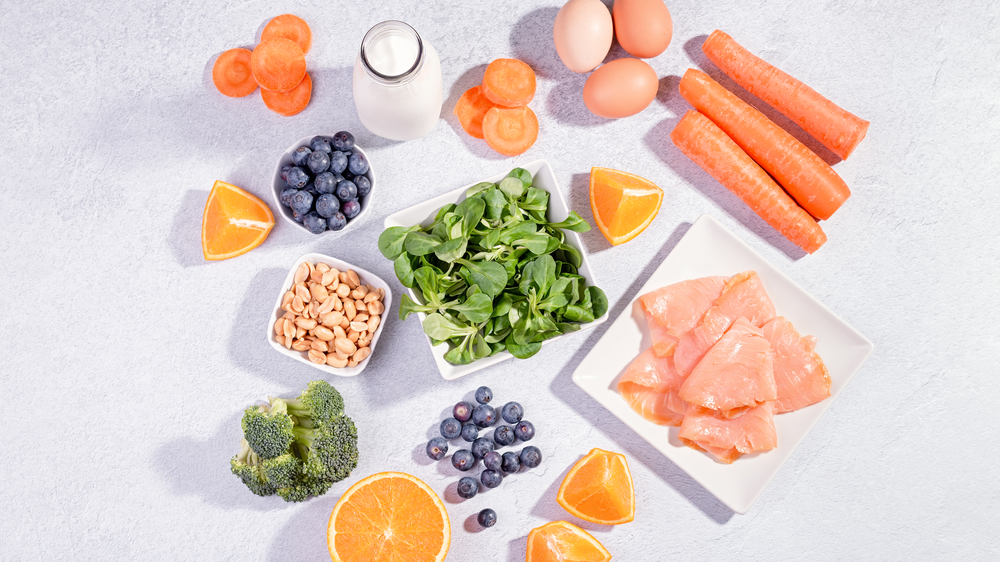
Protecting your vision goes beyond wearing glasses or contact lenses; it starts with a healthy lifestyle. Nutrition plays a vital role in maintaining eye health, preventing vision problems, and even slowing the progression of common eye conditions.
The Impact of Diet on Eye Conditions
A poor diet can accelerate the development of eye diseases. For instance, excessive sugar intake can increase the risk of diabetic retinopathy, while diets low in antioxidants may contribute to oxidative stress in the eyes, leading to AMD or cataracts. Incorporating nutrient-rich foods into your daily meals not only supports your eye health but also benefits your overall well-being.
Key Nutrients for Healthy Eyes
Certain vitamins and minerals have been shown to promote eye health and even prevent or slow the progression of common eye conditions like macular degeneration, cataracts, and dry eye syndrome. Here are some essential nutrients to incorporate into your diet:
1. Vitamin A
Vitamin A is crucial for maintaining good vision, particularly in low light. It helps protect the cornea (the surface of the eye) and is essential for proper functioning of the retina. Foods rich in vitamin A include carrots, sweet potatoes, spinach, and kale.
2. Omega-3 Fatty Acids
Omega-3 fatty acids, commonly found in fatty fish like salmon and tuna, are vital for preventing dry eye syndrome. They help maintain the structural integrity of retinal cells and support tear production.
3. Lutein and Zeaxanthin
These antioxidants are found in the macula, the part of the retina responsible for central vision. They help filter harmful blue light and reduce the risk of age-related macular degeneration (AMD). Dark leafy greens, such as kale and spinach, as well as eggs, are excellent sources.
4. Vitamin C
Vitamin C is a powerful antioxidant that helps reduce the risk of cataracts and slows the progression of AMD. Citrus fruits, strawberries, and bell peppers are packed with this essential vitamin.
5. Zinc
Zinc helps deliver vitamin A from the liver to the retina, ensuring proper production of melanin, a protective pigment in the eyes. You can find zinc in foods like oysters, beef, and fortified cereals.
Simple Tips for Eye-Friendly Nutrition
• Eat a colorful diet: Aim for a "rainbow" of fruits and vegetables to ensure you're getting a wide range of nutrients.
• Stay hydrated: Proper hydration supports tear production and reduces dry eye symptoms.
• Limit processed foods: Reduce your intake of refined sugars and unhealthy fats.
• Consider supplements: If your diet lacks key nutrients, supplements like omega-3 capsules or a multivitamin formulated for eye health can help bridge the gap.
Why Routine Eye Exams Matter
While proper nutrition is essential for eye health, it is not a substitute for routine eye exams. Regular visits to Dr. Brianna Herring, O.D., can help detect and monitor conditions like glaucoma, AMD, and diabetic eye disease before they cause significant vision loss. During an eye exam, Dr. Herring can assess your eye health, review your dietary habits, and recommend supplements or lifestyle changes if necessary.
Your Vision, Our Priority
By incorporating nutrient-rich foods into your diet and staying hydrated, you can provide your eyes with the support they need to function at their best. However, good nutrition is only part of the equation—annual eye exams are essential for detecting potential issues early and ensuring your vision stays sharp. Whether you need a comprehensive eye exam or guidance on how your diet impacts your vision, we’re here to help.
Reach out to Dr. Brianna Herring, O.D. to schedule your comprehensive eye exam, and get personalized guidance to keep your eyes healthy and strong. Visit our office in Deerfield Beach or Plantation, Florida. Please call (786) 891-2020 or (954) 472-2676 to book an appointment today.




